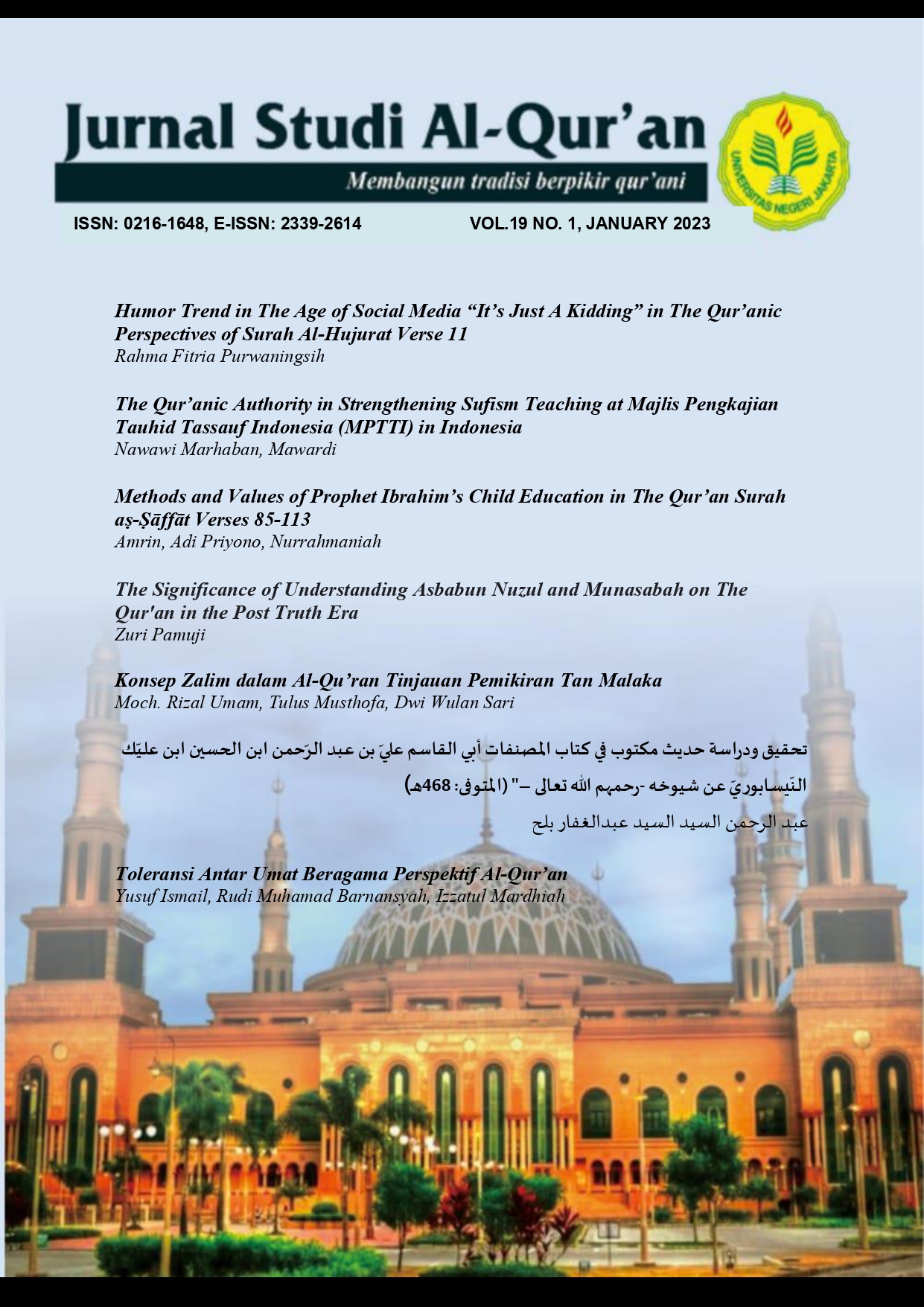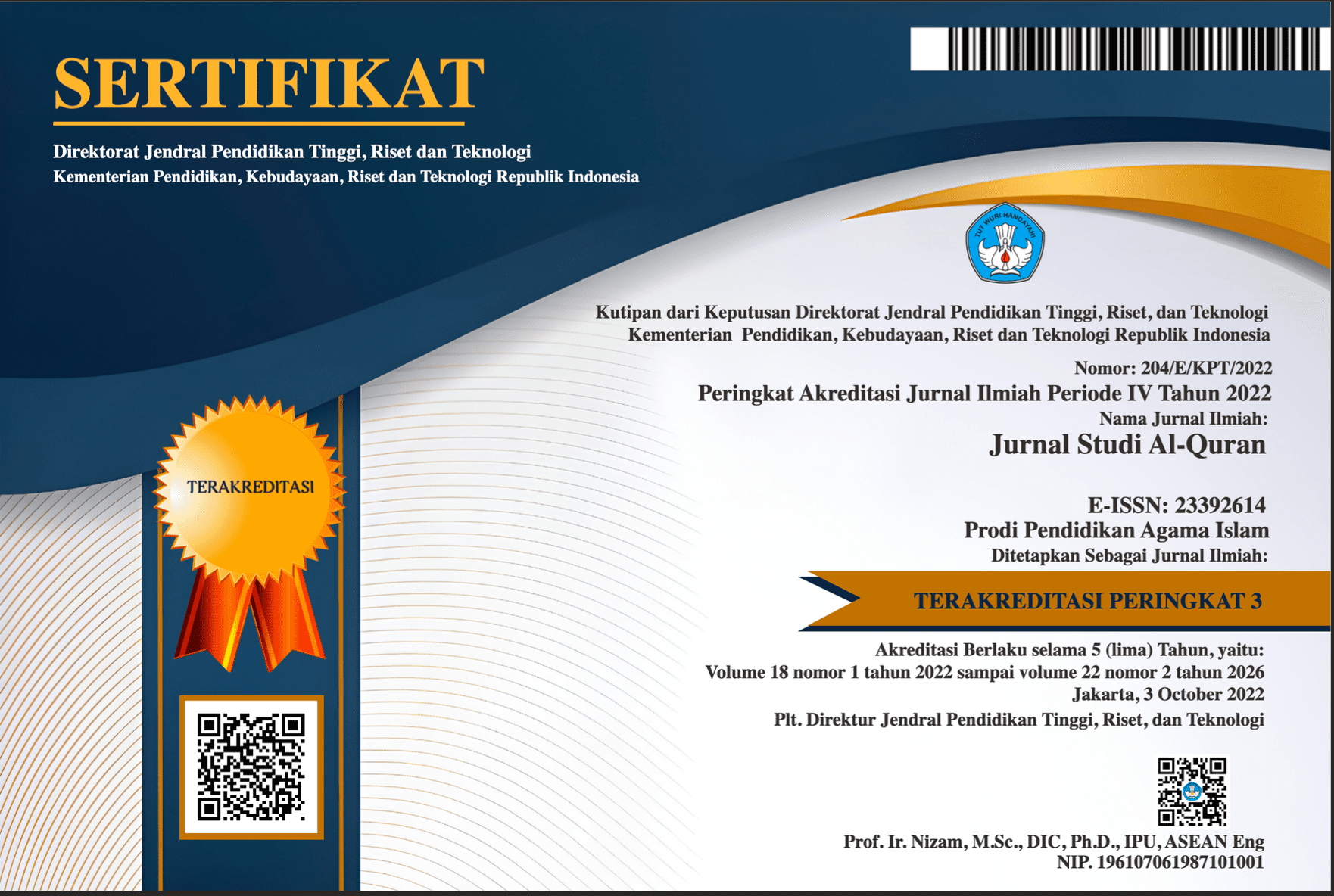The Concept of Zalim in the Al-Qu'ran a Review of Tan Malaka's Thoughts
DOI:
https://doi.org/10.21009/JSQ.019.1.05Keywords:
The concept of injustice, the Qur’an, Tan MalakaAbstract
Tyranny is a sin that has been explained in detail in the Qur'an. The form of tyranny today is still often developing in people's lives. This study aims to elaborate on Tan Malaka's thoughts regarding tyranny. This study uses a qualitative approach using library research and data collection techniques using documentation. The analysis technique used the descriptive-analysis method and then studied and connected with the character's thoughts, Tan Malaka. The results showed that Tan Malaka saw three forms of tyranny. 1) Every individual who did not get a decent job and did not get fair wages, 2) Did not get proper education, 3) Oppression of fellow human beings. According to Tan Malaka, the way to overcome this is through education: 1) providing sufficient weapons for the needs of life in the world of capital, 2) giving rights to students by way of association, and 3) showing obligations towards the kromo.
References
Ajahari. (2018). Ulumul Qur’an. Aswaja Pressindo.
Ali, M. dan W. Z. K. bin W. (2004). Siapa Itu Nabi-nabi. PTS Millennia.
Amrullah, S., Ramdani, Z., Amri, A., Pendidikan, M., Al-Falah, S., Bandung, K., Psikologi, F., & Sunan Gunung Djati Bandung, U. (2021). Manajemen Pengembangan Kurikulum Madrasah Aliyah (Studi Deskriptif di Madrasah Aliyah Al-Falah 2 Nagreg Kabupaten Bandung). 19(1). http://pakar.pkm.unp.ac.id
Denisova, T. A. (2011). Refleksi Historiografi Alam Melayu. Universiti Malaya.
Effendi, M. R. (2021). TEOLOGI ISLAM Potret Sejarah dan Perkembangan Pemikiran Mazhab Kalam. Literasi Nusantara.
H, I. (2019). Pendidikan Islam Membangun Akhlak Generasi Bangsa. Jurnal Ta’dibuna, 299–310.
Habiburrohman, M. (2020). Implementasi Nilai-Nilai Kepedulian Sosial Pada Peserta Didik Melalui Mata Pelajaran Al-Qur’an dan Hadist. Al-Misbah (Jurnal Islamic Studies), 8(2), 68–73. https://doi.org/10.26555/almisbah.v8i2.1172
Hambali. (2015). Konsep Pendidikan Dalam Perspektif Tan Malaka (Tokoh Revolusioner Prakemerdekaan). Intelektualita, 3(1), 243047.
Irfan. (2019). Konsep al-Zulm dalam Al-Qur’an (Suatu Kajian Tafsir Tematik), Ibn Abbas: Jurnal Ilmu Alquran dan Tafsir. 2(1).
Ishak Abd Rahman, J. A. M. (2014). Pentabiran Gaji Dan Upah Menurut Perspektif Islam. In ulum Islamiyyah (Vol. 3, Issue 1, pp. 35–54).
Jahada. (2013). Hak Asasi Manusia Menurut Al-Qur’an. Jurnal Al-Ádl, 6(1), 35–59.
Kerwanto. (2022). Dasar-Dasar Moderasi dalam Epistemologi Pendidikan Islam Perspektif Al- Qur ’ an. 18(1), 91–110.
Malaka, T. (1987). SI Semarang dan Onderswijs. Yayasan Massa.
Malaka, T. (2016). Dari Penjara ke Penjara. Narasi.
Murdiono. (2020). Al-Qur’an Sebagai Media Pembelajaran Ilmu Bayan. UMM.
Nasional, D. P. (2017). Kamus Besar Bahasa Indonesia. Jakarta: Gramedia, 58.
Nur Kholis Setiawan, D. S. (2010). Meniti Kalam Kerukunan: Beberapa Istilah Kunci dalam Islam dan Kristen. PT BPK Gunung Mulia.
Poaze, H. A. (1999). Pergulatan Menuju Republik Tan Malaka. Grafiti.
Poaze, H. A. (2008). Tan Malaka, Gerakan Kiri, dan Revolusi Indonesia. Y.O.I.
Rasyid, I. (2019). Konsep Pendidikan Ibnu Sina tentang Tujuan Pendidikan, Kurikulum, Metode Pembelajaran, dan Guru. Ekspose: Jurnal Penelitian Hukum Dan Pendidikan, 18(1), 779–790. https://doi.org/10.30863/ekspose.v18i1.368
Ridho, M. M. (2020). Supremasi keadilan dalam al-quran. Al Karima : Jurnal Studi Ilmu Al Quran Dan Tafsir, 1(2), 55–74.
Safliana, E. (2020). Al-Qur’an Sebagai Pedoman Hidup Manusia. Jihafas, 3(2), 71.
Samidi, R., & Suharno, S. (2019). Mengurai Gagasan Tan Malaka dari Perspektif Kajian Pendidikan Kewarganegaraan. Jurnal Sejarah Citra Lekha, 4(2), 89–99. https://doi.org/10.14710/jscl.v4i2.22658
Sahuddin, H. (2007). Al-Qur’an Dihujat. al-Qalam.
Surya, E. S. dan M. E. (2017). Model Produktivitas Kerja Ditinjau Dari Perspektif Al-Qur’an. 65–69.
Syarifah Habibah. (2015). Akhlak dan Etika dalam Islam. Jurnal Pesona Dasar, Vol.1(4), 81.
Tan, T. (2021). Invinsible Character Toolbox. IKAPI.
Yayasan Penyelenggara Penterjemah Al-Qur’an. (2008). Al-Qur’an dan Terjemahannya. Sinar baru Algesindo.
Downloads
Published
How to Cite
Issue
Section
License
Authors who publish with this Journal agree to the following terms:
- Author retain copyright and grant the journal right of first publication with the work simultaneously licensed under a creative commons attribution licensethat allow others to share the work within an acknowledgement of the work’s authorship and initial publication of this journal.
- Authors are able to enter into separate, additional contractual arrangementfor the non-exclusive distribution of the journal’s published version of the work (e.g. acknowledgement of its initial publication in this journal).
- Authors are permitted and encouraged to post their work online(e.g. in institutional repositories or on their websites) prior to and during the submission process, as it can lead to productive exchanges, as well as earlier and greater citation of published works.
Users/public use of this website will be licensed to CC BY










